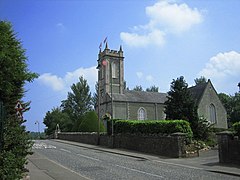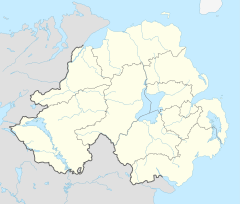|
Loughgall
Loughgall (/lɒxˈɡɔːl/ lokh-GAWL; from Irish Loch gCál)[1][2] is a small village, townland (of 131 acres) and civil parish in County Armagh, Northern Ireland. It is in the historic baronies of Armagh and Oneilland West.[3] It had a population of 282 people (116 households) in the 2011 Census.[4] Loughgall was named after a small nearby loch. The village is surrounded by orchards. HistoryIn the Middle Ages the chiefs of the Uí Nialláin, a Gaelic clan, resided at Loughgall crannog, a fortified lake dwelling.[5] By the 16th century the O'Neills of Tír Eoghain had taken over the area, and the crannog became the residence of the O'Neill chief's brother or eldest son.[6] In the early 1600s, the area was settled by English and Scottish Protestants as part of the Ulster Plantation. During the 1641 Irish Rebellion, settlers were held at a prison camp at Loughgall by Catholic rebels led by Manus O'Cane.[7] In 1795, rival sectarian gangs, the Catholic Defenders and Protestant Peep-o'-Day Boys fought a bloody skirmish near the village, called the Battle of the Diamond, that left around 30 people dead. Following this, the Protestant Orange Order was founded in Dan Winter's House nearby. The TroublesThe Loughgall area experienced a number of fatal incidents during The Troubles, the best known of which is arguably the 1987 Loughgall ambush.[8] SportIt is home to Loughgall Football Club, which plays in the NIFL Premiership, the top tier of football in Northern Ireland. Education
People
Civil parish of LoughgallThe civil parish contains the villages of Annaghmore, Charlemont and Loughgall.[3] The civil parish contains the following townlands:[3]
See also
References
External links
Wikimedia Commons has media related to Loughgall. |
||||||||||||||||||||||||||||||


